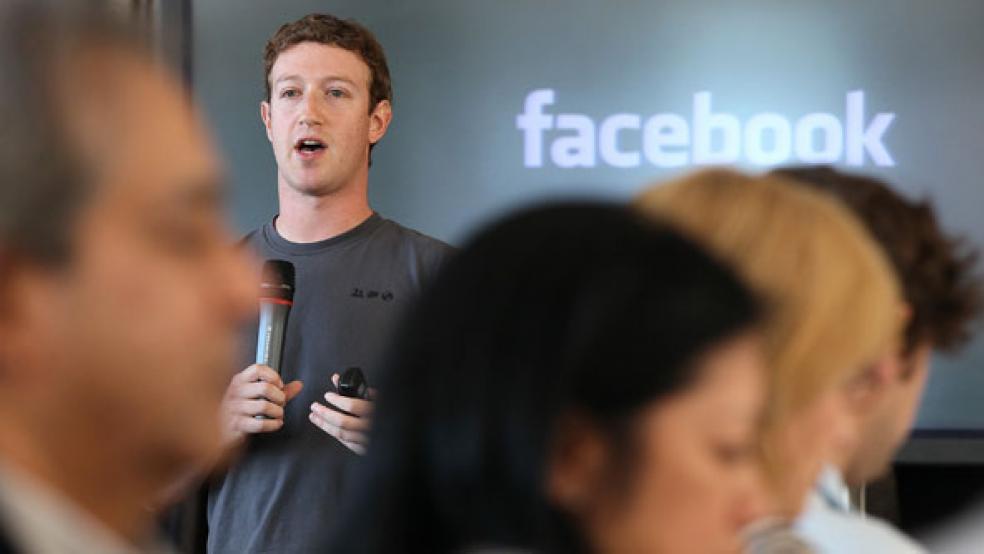It sure looks like Facebook (FB) chose exactly the right point in its corporate evolution to go public – at least as far as the company itself is concerned. Investors, however, aren’t quite so happy about that timing in light of the second-quarter financial results the company announced yesterday afternoon. In its first earnings report as a public company, Facebook announced another sharp decline in the rate of revenue growth – another signal that the social media leader may have completed its IPO just as its growth, after years of massive gains, was poised to slow down to more normal levels. Facebook stock, which went public at $38 a share, opened trading Friday at just over $23, a new low that represents a plunge of about 14 percent from Thursday’s close.
Granted, most companies would be delighted to report that their revenues grew 32 percent in the second quarter; indeed, many are having the opposite problem, being able to increase their bottom lines only by cutting costs, given flat or declining revenue. But Facebook isn’t just any company – it’s a “high expectations” stock, one of an increasingly small handful of companies trading at a lavish premium to the market.
Facebook’s results actually beat analysts’ official expectations, but those analysts’ numbers didn’t fully reflect what the market needed to see to continue according the stock its lofty multiple. While the price/earnings ratio on the S&P 500 index hovers at around 12, down from a long-term average of about 15, Facebook currently trades at around 60 times trailing earnings, and 50 times prospective earnings. When that much of a premium is baked into the stock price, investors don’t want even the slightest bit of uncertainty, much less the kind of news they received from Facebook’s earnings release.
Facebook’s bottom line isn’t really the issue here. True, the company’s IPO-linked stock compensation expenses meant that it posted a net loss of $157 million, or 8 cents a share, compared to a profit of $240 million, or 11 cents a share, in the second quarter of 2011. But after taking out the one-time expense, Facebook’s profit was 12 cents a share, pretty much what Wall Street analysts had been anticipating.

The problem is that both the Street and investors also had been expecting that Facebook would announce a healthy positive surprise to the top line – and that didn’t materialize. Even more importantly, Facebook execs on the traditional conference call after the earnings announcement failed to provide listeners with enough specific insights into what they are doing to improve matters. When investors have high expectations, warm and fuzzy generalities don’t suffice.
Anyone looking for more details about how Facebook plans to monetize its growing base of mobile users didn’t get much clarity. While Facebook’s users are turning to mobile apps and accessing their profiles and social networks on the go, those smartphone addicts are accessing fewer ads that way.
Moreover, as Facebook’s chief financial officer acknowledged, they aren’t using the company’s payments network in order to play online games on their mobile phones to the extent that the company had anticipated. One reason that some observers have suggested this is occurring is that it’s harder to see and “click” on advertising links on smartphone screens that are much smaller than even a typical laptop or iPad display. But whatever the reasons, the figures are disappointing, and Facebook execs didn’t seem to provide analysts on the conference call with detailed enough plans to address this.
Facebook isn’t the only high-expectations stock to fail to deliver on the promise implied by its lofty price/earnings ratio. Indeed, Facebook’s woes were foreshadowed by Zynga (ZNGA), the online games company that generates about 10 percent of Facebook’s revenue, which dramatically cut its forecasts for 2012, prompting a 39 percent plunge in its stock price. Zynga today is a “single digit midget,” as stocks trading below $5 once were referred to scathingly. At $3 and change, Zynga stock trades for a fraction of its post-IPO high of nearly $16.
But in Facebook’s case, when its S-1 IPO filing landed with the SEC early this year, it was already clear that growth was flagging; indeed, it would have been surprising had that not been the case at an 8-year-old business that had gone from being a startup to a behemoth market presence in short order.
At some point, the law of large numbers kicks in. At today’s market price, Facebook’s valuation is finally in a range that some critics of its IPO believe was more appropriate all along – about $65 billion. It’s just too bad that shareholders who bought stock in that IPO have had such a bumpy ride over the last three months, starting with the bungled IPO and ending with yesterday’s earnings announcement.
Still, it serves as a reminder to proceed with caution when it comes to high-expectations stocks. These market darlings are priced for perfection, and any bit of news that falls an iota short of that mark plus will be viewed as a major blow – especially in an already jittery market environment. Caveat emptor.





